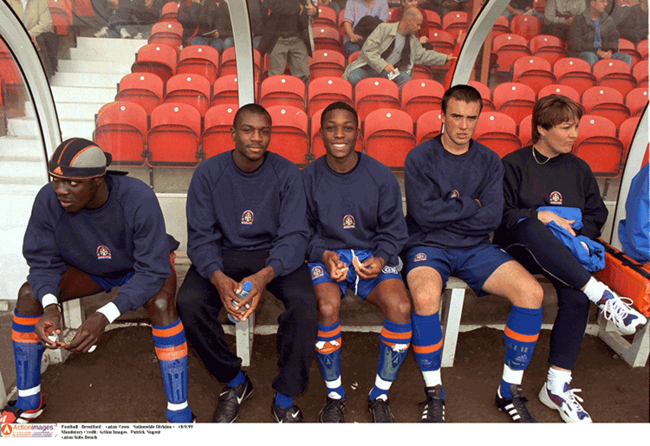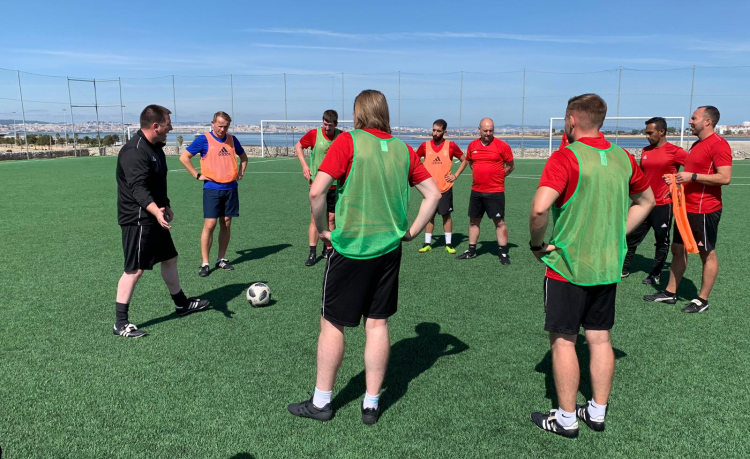Playing time in your game model
Coaching Adviceby Dave Clarke
How you use your players in matches is a key part of your game model – and with many clubs in lockdown and training going online it is a great time to review your game time policy.
How you use your players in matches is a key part of your game model – and with many clubs in lockdown and training going online it is a great time to review your game time policy.
The rule that all players get equal time on the pitch is in essence a good one but that does not tell the whole picture when it comes to managing your team. Sometimes the suitability of players in certain games means they will get less time than some of your other players and fitness and discipline are also factors that need to be taken into account. But for sure when it comes to planning your game model and which players are involved you need to think about a full season of using substitutes.
Who plays and who sits on the bench should not reflect the game time a player has, it should be something that every player experiences not just the one or two who are at a different level of development to the others. I know that players hate starting the game on the bench and hate finishing the game on the bench so you must make sure there is a rota for doing this.
Where this falls down is when players miss training or turn up late for the match – of course they should start on the bench for the match because it isn't fair on the players who do put the effort in to train and to get to the match when you want them to arrive.
Check out the advice below to help you work with your players so they and their parents are happy with the way you handle substitutes on match days.
Winning combinations and the need to develop individuals means that you cannot play matches with the same players on the subs bench. They will fall behind and the team will find it hard to be at their best when injuries or holidays mean players are absent from the team. How to handle the subs helps you to sort out who should be on the bench.
I had a letter sent to me that asked "I rotate my players each week but one dad is not happy his son is going to sit out a match – how should I deal with this?". Read the email and my answer if you have had similar problems with parents not liking who gets subbed and who doesn't.
Another assistant coach is having problems because the head coach is only giving some players 10 or 15 minutes on the pitch before subbing them. "Is this acceptable," he asks? Read my reply and see if you agree.
Finally, Young players are often easily discouraged when they are a substitute or get subbed off and, once they're feeling demoralised, it can get in the way of their performance on the pitch, so it's in your interest to keep them in the loop and happy with their role. How to keep your subs involved gives them tasks to do to keep their focus during a game.
How to handle the subs
I rotate my players each week but one dad is not happy his son is going to sit out a match – how should I deal with this?
The manager is only giving the subs 10-15 minutes – is this acceptable?
How to keep your subs involved
The rule that all players get equal time on the pitch is in essence a good one but that does not tell the whole picture when it comes to managing your team. Sometimes the suitability of players in certain games means they will get less time than some of your other players and fitness and discipline are also factors that need to be taken into account. But for sure when it comes to planning your game model and which players are involved you need to think about a full season of using substitutes.
Who plays and who sits on the bench should not reflect the game time a player has, it should be something that every player experiences not just the one or two who are at a different level of development to the others. I know that players hate starting the game on the bench and hate finishing the game on the bench so you must make sure there is a rota for doing this.
Where this falls down is when players miss training or turn up late for the match – of course they should start on the bench for the match because it isn't fair on the players who do put the effort in to train and to get to the match when you want them to arrive.
Check out the advice below to help you work with your players so they and their parents are happy with the way you handle substitutes on match days.
Winning combinations and the need to develop individuals means that you cannot play matches with the same players on the subs bench. They will fall behind and the team will find it hard to be at their best when injuries or holidays mean players are absent from the team. How to handle the subs helps you to sort out who should be on the bench.
I had a letter sent to me that asked "I rotate my players each week but one dad is not happy his son is going to sit out a match – how should I deal with this?". Read the email and my answer if you have had similar problems with parents not liking who gets subbed and who doesn't.
Another assistant coach is having problems because the head coach is only giving some players 10 or 15 minutes on the pitch before subbing them. "Is this acceptable," he asks? Read my reply and see if you agree.
Finally, Young players are often easily discouraged when they are a substitute or get subbed off and, once they're feeling demoralised, it can get in the way of their performance on the pitch, so it's in your interest to keep them in the loop and happy with their role. How to keep your subs involved gives them tasks to do to keep their focus during a game.
How to handle the subs
I rotate my players each week but one dad is not happy his son is going to sit out a match – how should I deal with this?
The manager is only giving the subs 10-15 minutes – is this acceptable?
How to keep your subs involved
Newsletter Sign Up
Coaches Testimonials

Gerald Kearney, Downtown Las Vegas Soccer Club

Paul Butler, Florida, USA

Rick Shields, Springboro, USA

Tony Green, Pierrefonds Titans, Quebec, Canada
Subscribe Today
Discover the simple way to become a more effective, more successful soccer coach
In a recent survey 89% of subscribers said Soccer Coach Weekly makes them more confident, 91% said Soccer Coach Weekly makes them a more effective coach and 93% said Soccer Coach Weekly makes them more inspired.
*includes 3 coaching manuals
Get Weekly Inspiration
All the latest techniques and approaches
Soccer Coach Weekly offers proven and easy to use soccer drills, coaching sessions, practice plans, small-sided games, warm-ups, training tips and advice.
We've been at the cutting edge of soccer coaching since we launched in 2007, creating resources for the grassroots youth coach, following best practice from around the world and insights from the professional game.
More from us
© 2023 Soccer Coach Weekly
Part of Green Star Media Ltd. Company number: 3008779
We use cookies so we can provide you with the best online experience. By continuing to browse this site you are agreeing to our use of cookies. Click on the banner to find out more.







